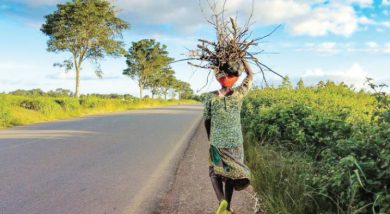Out of darkness
For over six years that Vivian Bwanausi has been teaching at Mtembe Primary School in Lilongwe Rural, preparations for class-work have been difficult due to lack of power.

But this is a story of the past as Bwanausi is one of the five teachers at the school who are now using solar lamps.
“Preparations for classwork at night used to be challenging. With a house of three bedrooms, I needed a paraffin lamp in each or three candles. This was becoming costly,” says Bwanausi.
This was the lot of other teachers at the school, who, just like her, would remain with loads of unmarked scripts for days as they would not use night time to finish marking due to lack of power.
The situation at Mtembe Primary School mirrors many primary schools in rural Malawi that have no access to electricity.
In the country, an average household uses 55 or so litres of paraffin every year, at an approximate cost of $158 (about K116 000).
Currently, about 10 percent of the population has access to electricity supplied by Electricity Supply Corporation of Malawi (Escom) and solar energy is seen as an alternative power to close the gap.
Sadly, health experts argue the burning of kerosene inside houses contributes to health problems such as respiratory illness, eyesight problems, burns as well as fires and death in the developing world.
That is why almost six months after a solar lantern graced her living room, Bwanausi’s face still beams with excitement.
“The solar project is good, it works well as it does not only light our homes but power our electrical devices. We no longer admire those that have power in their houses as we charge phones, use radios and read, especially for school pupils,” she says.
Bwanausi is ‘lucky’ to have moved out of roughly one billion people which is about 13 percent of the world’s population, living without electricity, according to the 2018 Energy Progress Report.
“As a teacher, the solar system has helped me a lot and improved my performance since I can prepare my lessons and marking in good time. In the past, I was relying on a torch which was costly due to constant need to replace batteries,” she narrates.
The five teachers are beneficiaries of an agreement between Sunny Money and SolarAid with Fincoop Malawi which sees the former providing solar equipment with the latter financing it.
“We have a deal with Fincoop whereby we are working with them to solve some of the challenges in accessing solar power in terms of financing. Since we started operating in 2006, we noted that the biggest challenge for consumers is financing and we had to come up with an innovative way that will benefit the user,” says Sunny Money and SolarAid general manager Brave Mhone.
So they agreed with Fincoop on flexible loans targeting consumers and to provide solar lights to individuals across the country.
The company is providing one to 10 watts solar panels power output capable of lighting one to three lamp systems. The system, mostly for home lighting costs K65 000 with Fincoop providing a loan payable between six to 12 months.
Fincoop general manager, Macmillan Nankhonya, says they are filling the gap created by the uneven uptake of renewable energy solutions in rural Malawi.
“Apart from financing where no institution was interested in meeting the energy needs of rural Malawians, there is energy poverty in Malawi. We have created a product within our system called Green Loan which is open to anybody; farmers, teachers and others in the rural communities,” he explains.
Of late service stations in the country have not been stocking paraffin, leaving those in the rural like Bwanausi with little option.
“The cost of paraffin or candles is higher compared to that of a solar system in a year. As such, now people are making a saving.
“Again, school children are able to study now and for teachers, they can prepare for classes easily. On top of that, there are no health hazards emanating from paraffin gas,” explains Nankhonya.
As the demand for energy increases with Escom’s power being erratic, solar energy is doing wonders to some rural communities for the time being and Bwanausi in particular cannot stop smiling for the light that has shown into darkness for her.





